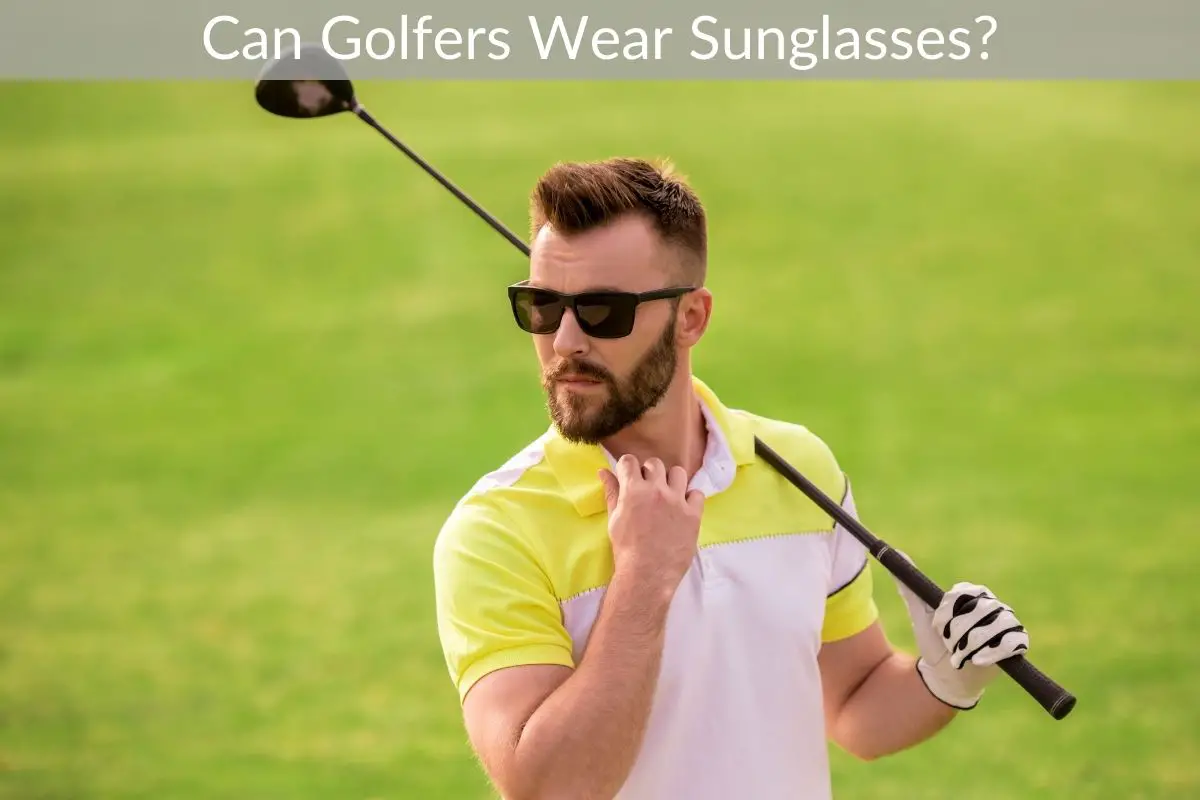Table of Contents
*This post may contain affiliate links. As an Amazon Associate we earn from qualifying purchases.
Undoubtedly, given the duration of a golf round (generally 4.5 hours for an 18-hole course), a golfer remains in the sun for around five times longer than a tennis round played in the same weather situation. Therefore, the perfect golfer must be equipped with a pair of glasses to protect their eyes.
However, it is not mandatory.
Whether or not golfers wear sunglasses while golfing comes down to their personal preference – there is no right or wrong answer. Some players play better when they wear sunglasses, while other players feel that they perform better on the field without them. Most will wear sunglasses when it’s really bright outside.
This is why many golfers do not prefer to wear them on the course. They believe that sunglasses interfere when it comes to depth perception and contrast. For them, having an accurate vision is more important than facing sunlight during a swing. However, protecting eyes from intense sunlight is far more important as it can lead to premature aging of the eye and other serious issues.
Here’s our explanation of why golfers should wear sunglasses when playing and whether it affects their game or not!
To see some of the latest and greatest golfing gadgets currently on the market just click here.
What Sunlight can do to Your Eyes?
Moving around or working outdoors without wearing sunglasses can cause premature aging of the eye and lead to all sorts of problems. Therefore, it is very important to protect your eyes when playing golf and when working on a golf course, especially teachers and people on maintenance teams who spend a large part of their day outdoors.
Therefore, the perfect golfer must be equipped with a pair of golf glasses adapted to the context. They allow golfers to enjoy optimal vision, perfect protection against the sun and projections, without forgetting that they must accentuate the visual contrasts.
The Ideal is to Wear Sunglasses to Protect the Eyes
The ideal is to wear sunglasses with good quality lenses to protect the eyes from solar radiation (against UVA and UVB rays.) The ideal is to buy your glasses from an optician to get the advice of a professional. Today there are “sport” models that are particularly light and easy to wear. However, if you have trouble playing with these glasses or face issues in appreciating distances and reliefs, the right attitude is to wear the glasses between shots and take them off when hitting the ball.
Finally, for professional teachers and maintenance staff who are exposed all the time, wearing glasses should be almost permanent.
Are there Perfect Glasses for Golf?
Not really. The constraints, it is true, are numerous. Many manufacturing brands keep on evolving glasses adapted to the practice of golf. Golfers need glasses that protect against UV rays and glare while optimizing the vision of reliefs, contrasts and depths.
However, there are some factors that you must consider in good golf sunglasses. Let’s discuss them!
The Technical Characteristics of the Optimal Golf Sunglasses
Golf goggles are a quality support for achieving excellent performance. Also, their characteristics must include perfect support and an extended field of vision.
During golf games, it is essential to visualize the ball, the fringe, the rough, the fairway, the reliefs, the holes and other elements in an optimal way. Visual acuity must therefore be perfect. It is also necessary to follow the trajectory of the ball over long distances.
The models offered for golf are therefore equipped with curved lenses. This thus makes it possible to improve lateral vision, without being hindered by the frame. There are golf sunglasses with lenses extended to the temples, ensuring good protection but also maximum visual coverage. Some models even lack a central bridge. These panoramic glasses guarantee a wide field of vision without obstacles.
It is important to find a model that meets the two essential criteria: comfort and support. Golf games and tournaments can last several hours in direct sunlight, with a lot of movement. The head, in particular, has to move a lot when swinging or following the ball. Therefore, a golfer must opt for a consensus between these two elements, lightweight glasses with soft plastic or rubber pads.
Several categories of glasses are made of plastic and equipped with polycarbonate lenses. The temples must be very flexible, and a cord or a small strap can complete the set to prevent the glasses from falling on the ground. The result is an ultra-light, unbreakable and easy-to-wear sunglasses model.
Indeed, during rounds of golf, the player must be able to rely on extremely precise vision. They must visualize a series of elements at the same time. Anyone subject to a visual defect, even a very slight one, can experience a drop in performance without suitable lenses. The eyes must indeed work even more to compensate for the visual deficit. This results in significant visual fatigue and damaged eyes.
It is advisable to get our eyes checked and wear contact lenses associated with a pair of glasses without correction to benefit from good visual acuity. Another possibility is to wear prescription golf goggles equipped with lenses with the correct correction.
Finally, golfers can also choose suitable progressive lenses. In this way, they benefit from an optimal vision of near or far, whatever the distance.
Do PGA Golfers Wear Sunglasses?
More and more, we see on our television screens professional golfers wearing sunglasses. Yet very few of them wear them, preferring to wear them on the front or back of their cap.
Apart from wearers of prescription glasses (who generally use contact lenses), these players wear sunglasses to protect them from UV and allow them to see the ball better, especially during its flight towards the chosen target.
We know that big advertising contracts oblige these champions to highlight these products for which they are handsomely paid.
Rory McIlroy, for example, never wears the glasses but on the back of their cap. We even saw the great Tiger Woods wear sports glasses his last two years. Others, like Ian Poulter, wear their glasses all the time.
Conclusion
Thus, wearing or not wearing sunglasses is a golfer’s personal preference, but it is highly recommended in summers when the players spend hours in the sunlight. Wear sunglasses equipped with lenses that protect against UV and light.
Prefer a purchase from an optician who can advise you on the tint of the lenses (gray, gray-green, normal), the choice of tint is rather personal. If wearing sunglasses bothers you during play, wear them between shots and take them off only when playing.

